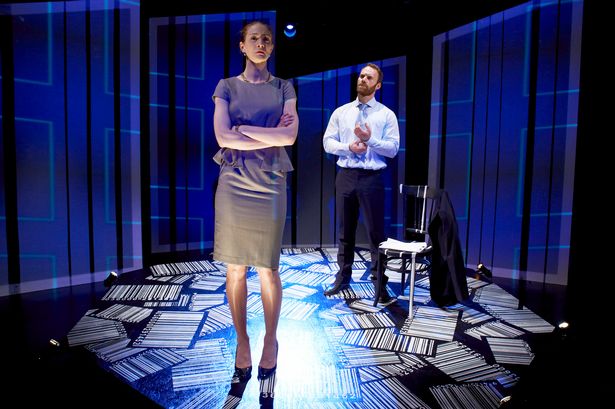by Waking Exploits, at Chapter Arts Centre
written by Dennis Kelly
A monologue can often be a tricky theatrical device, difficult to validate and often awkward to integrate into dialogue. Waking Exploits’ production of Love and Money relies heavily on monologues and lengthy ones at that. But rarely are such monologues so perfectly executed and interwoven into a piece of theatre as they are in this production directed by Ryan Romain.
Love and Money explores the realities of a demanding consumerist society. Saddled by debt, how far will one person go to escape? Is there an honest way to make money fast? Does anybody truly want to help those in need? This topical production doesn’t aim to answer such questions per se but aims to highlight them in a way which exposes the unrealistic demands of modern society. Over an hour and a half, the audience witnesses the destructive effects of debt: the breakdown of relationships, guilt, and seedy quick-fix solutions.

The piece begins with an email exchange between David (Will Thorp) and his lover Sandrine. Through these casual interchanges, David slowly reveals the shocking truth behind his wife’s suicide on account of their £70,000 debt. With the use of white screens on which dates of exchanges are recorded, a sense of time is cleverly communicated; the screen permitting the plausible passing of time without seeming rushed or clumsy. The screens work to indicate hesitance in the ability to trust a lover, conveyed in days of silence between correspondences. We are then introduced to the grieving parents of Jess, David’s late wife. Expertly played by Keiron Self and Rebecca Harries, the pair begin by discussing the cost of their daughter’s gravestone. They flow from a poignant comedy double act to distraught parents supporting each other through a difficult time. As the production moves on, it becomes clear that the series of events are moving backwards in time. The effects of this ensure a greater sense of poignancy anchored in dramatic irony when the character of Jess appears, bright-eyed and full of hope for the future.
The production carries a collectively strong cast, but Sara Lloyd-Gregory gives a solid performance as the naïve Jess. She is completely endearing, displaying effortless humour tinged with a hint of self-destruction. Joanna Simpkins is also a stand-out, naturally and skilfully funny.
Declan Randall’s interactive set was effective, if not a little overly symbolic. Aside from the screens previously mentioned, the small space was littered with bar codes. Although the set was obviously intended to convey a major theme, it did feel slightly too stylised for the nature of the script. The minimalistic set ensured swift scene changes and the production didn’t seem to lull at any point.
Productions in which monologues are prominent can be a challenge. They risk punctuating the flow of the piece in a distracting manner. Waking Exploits do a great job of ensuring that this doesn’t happen. An enjoyable, poignant piece of theatre which enables the audience to become completely engrossed in the story and absorbed into the characters.










